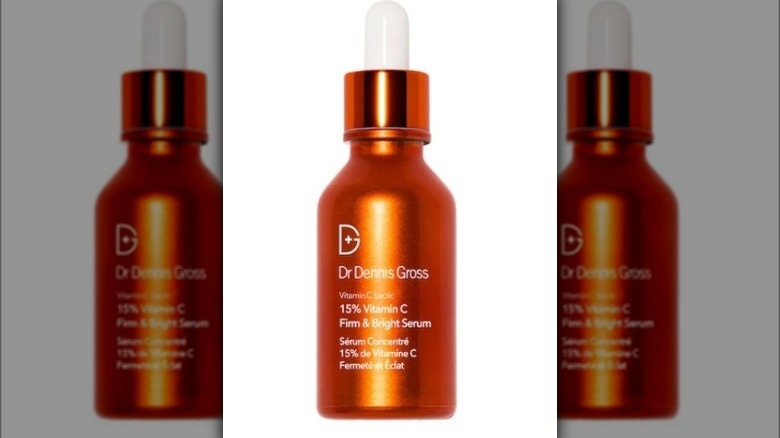Dr. Dennis Gross Reveals Why Vitamin C And Lactic Acid Make The Ultimate Skincare Combo – Exclusive
We may receive a commission on purchases made from links.
If you're tired of your dull skin and want it to glow, you might have heard that Vitamin C can help. Annie Chiu, M.D., a board-certified cosmetic and general dermatologist on faculty at Cedars-Sinai Medical Center, told Self, "Vitamin C has a wide range of protective and anti-aging effects for the skin," which means it can do more than make you glow. However, according to Angela Lamb, board-certified dermatologist and director of Westside Mount Sinai Dermatology Faculty Practice, Vitamin C comes in various concentrations and formulations that may irritate some people (per Self).
On the other hand, lactic acid is an alpha hydroxy acid (AHA). It's a lesser-known and less irritating skin brightener. Dermatologist Tiffany Libby told HelloGiggles that it is "one of the gentlest chemical exfoliants" to get rid of dead skin. Another dermatologist, Robyn Gmyrek, added that it's super helpful to treat "sun-induced hyperpigmentation and melasma."
We spoke with world-renowned celebrity dermatologist Dr. Dennis Gross, who told us why Vitamin C and lactic acid play so well together. Previously, Dr. Gross told us about a major sunscreen mistake. He is a skin-cancer researcher with an award-winning medical-grade skincare line that prioritizes health and safety by eliminating over 1650 ingredients for their potential toxicity, per Dr. Dennis Gross. Considered "one of New York Magazine's Best Doctors for his expertise in skincare" (per Dr. Dennis Gross Dermatology), we got first-hand information on why you should add the Vitamin C and lactic acid combo to your skincare routine ASAP.
Vitamin C and lactic acid are a match made in heaven in the skincare world
While top-notch skincare ingredients can do wonders for your skin, you must be mindful about using certain ingredients together, and mixing some products can be known to cause irritation, like Vitamin C and retinol. Dermatologist Rachel Maiman recommends using Vitamin C in the AM and retinol at night, per The EveryGirl, to avoid a bad interaction. Their varying pH doesn't work well together, which could cause increased skin irritation. However, Vitamin C and lactic acid actually complement each other.
Dr. Dennis Gross told The List, "Vitamin C is one of the most important antioxidants for repairing and protecting the skin." However, he added that clinical studies have shown that when Vitamin C is paired with lactic acid, it improves antioxidant absorption and performance. According to dermatologist Robyn Gmyrek, lactic acid is "primarily used as a humectant in moisturizers to help draw water into the skin and as a regulator of pH," (per HelloGiggles). Therefore, it can help keep your skin soft without irritation.
Dr. Gross told us, "Lactic acid is a gentle alpha hydroxy acid that removes the dead skin cells from the skin surface to enable product absorption while replenishing ceramides to lock in moisture. Additionally, recent medical studies have also shown that lactic acid also has antioxidant properties, so when the two ingredients are paired together, they neutralize free radicals in all layers of skin — giving you double the protection."
You can use this combination all year round
Dermatologists recommend avoiding certain ingredients at specific times of the year, like using harsh chemical exfoliants in the summer. Dermatologist Harold Lancer recommends you hold off on strong exfoliating ingredients in the summer months because they can increase your sun sensitivity, per Well+Good. However, you don't have to worry about using the Vitamin C and lactic acid combination any time of the year.
According to Dr. Dennis Gross, using this combination is perfectly safe, no matter the season. Dr. Gross told The List, "The new Vitamin C Lactic technology is designed to be used year-round to combat daily sun-aging and repair existing damage. The skin likes consistency, so once you find a product within the collection that suits your skin's needs, stick with it to see best results."
Pure Vitamin C is pretty unstable in its active form (per Byrdie). However, cosmetic chemist Ron Robinson told Byrdie that's why its combined with other ingredients, to stabilize it and make it more sensitive skin friendly. Dr. Gross told us, "While some forms of Vitamin C can trigger irritation, the Vitamin C Lactic line is formulated with lactic acid and squalane to soothe skin and strengthen the moisture barrier, so you won't throw your skin off balance. Daily use of Vitamin C also stimulates collagen production — the key to healthy, strong skin." He recommends the Dr. Dennis Gross Vitamin C Lactic 15% Firm & Bright Serum.
Every skin type can benefit from this combination
Depending on your skin type, some ingredients can work wonders, while others can worsen your skin issues. If you have acne-prone skin, for example, face oils might not be your BFF. "Natural oils (like coconut) work for some, but not always for everyone, since they are highly comedogenic and tend to clog pores," Dr. Batul Patel, medical director and dermatologist at The Bombay Skin Clinic, told Vogue. Similarly, salicylic acid can be a nightmare for dry skin (per Women's Health). People with extremely sensitive skin have to be extra careful choosing ingredients, as many can have adverse reactions.
Thankfully, people with any type of skin don't have to worry about using the Vitamin C and lactic acid combination. Dr. Dennis Gross told The List, "This ingredient combination is well tolerated by all skin types, especially sensitive skin. When someone has sensitive skin, they likely have a weakened moisture barrier." A damaged skin barrier can lead to chronically dry and severely inflamed skin, and products with ceramides and glycerin can help soothe and heal it, per Healthline. Generally, you need a more stable version of Vitamin C for sensitive skin.
Dr. Gross told us, "Vitamin C on its own improves barrier resilience, but when it's paired with a soothing ingredient like lactic acid, the ingredients work synergistically together to strengthen skin barrier function, lock in moisture, and deliver results without causing irritation or redness." This combination is a win-win for everyone.
The Vitamin C and lactic acid combination is pregnancy-safe
Your skin type can dictate what skincare ingredients you can and can't use, though it can become a bit more complicated during pregnancy and breastfeeding, as you might have to take a break from products that were perfectly safe for you to use earlier. Hormonal changes will affect your skin, and you might get a pregnancy glow or skin issues you never had before, such as dry skin, acne, or melasma (per Healthline).
A study published in the Official Publication of The College of Family Physicians of Canada doesn't recommend retinoid use during pregnancy for potential congenital disabilities, so it's best to avoid all over-the-counter and prescription retinoids while pregnant. You should also avoid salicylic acid, benzoyl peroxide, hydroquinone, and chemical sunscreens during this time, per Women's Care.
While switching up your skincare routine during this time, however, you can keep using Vitamin C and lactic acid. Dr. Dennis Gross told The List, "You can also use Vitamin C and lactic acid during pregnancy and breastfeeding. I always recommend checking with your physician before introducing new ingredients into your routine, but in general, both ingredients are considered safe and will help brighten dark spots and hyperpigmentation that are associated with pregnancy melasma." Dr. Gross does recommend doing a patch test, though, to see how your skin will react to the combination, as hormonal changes during pregnancy and breastfeeding can impact your skin's sensitivity levels.
Misconceptions surrounding Vitamin C and lactic acid pairing
People think drinking water keeps your skin hydrated, but Dr. Howard Sobel told Forbes, "There is no evidence that drinking more or less water is helpful or harmful to your skin." There's always a bunch of facts and myths regarding skincare, which is why we turn to skincare experts to know the real truth.
Dr. Dennis Gross told The List, "There are a few misconceptions out there saying that you can't layer Vitamin C and lactic acid because it will be too harsh for the skin, and formulating the ingredients in the same bottle can throw off the pH of the product and deactivate it." He said the combination works and is perfectly safe to use with the correct formulation. "Lactic acid and L-ascorbic acid can be formulated in the same bottle because the two ingredients have an overlapping pH range. So as long as the product's pH sits in this range, you can formulate them together," he added.
But what if you don't have them already combined by the brand? Dr. Gross told us, "If you want to go the layering route, you should apply your lactic acid before Vitamin C. This is because lactic acid is an exfoliant, and you don't want to waste your Vitamin C product if you're going to take it off moments later when you apply your lactic acid." He added that it's essential to remember that both ingredients can cause sensitivity — especially at high concentrations.





